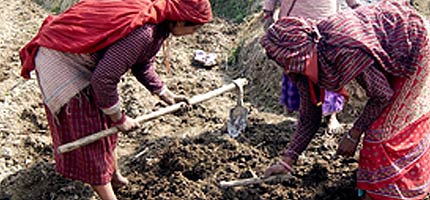©LWF/DWS Nepal
A Struggle for Food Security and Sovereignty
The Joseph Stories
Selections from the Joseph stories in Genesis connect our Christian faith with food security, although interpreting them can be a challenge. They can be misused to justify the market and corporate right to control food production, access and distribution. The challenge is to read the Bible in dialogue with the issue of food justice today. These stories reveal how the need for food can be exploited by dominant powers.
Storing or Accumulating?
During the seven plenteous years the earth produced abundantly. He gathered up all the food of the seven years when there was plenty in the land of Egypt, and stored up food in the cities; he stored up in every city the food from the fields around it. So Joseph stored up grain in such abundance—like the sand of the sea—that he stopped measuring it; it was beyond measure.
(Gen 41:47-49)
Joseph had the vision to store the food needed during times of famine. This is important. However, in this case, the basic need to store food so that people could eat was turned into a practice of unlimited accumulation that increased Joseph’s power and influence.
Famine, Food and Trade
The seven years of plenty that prevailed in the land of Egypt came to an end; and the seven years of famine began to come, just as Joseph had said. There was famine in every country, but throughout the land of Egypt there was bread. When all the land of Egypt was famished, the people cried to Pharaoh for bread. Pharaoh said to all the Egyptians, “Go to Joseph; what he says to you, do.” And since the famine had spread over all the land, Joseph opened all the storehouses, and sold to the Egyptians, for the famine was severe in the land of Egypt. Moreover, all the world came to Joseph in Egypt to buy grain, because the famine became severe throughout the world.
(Gen 41:53-57)
God’s wisdom was given to Joseph, and he prepared for a time of hunger. But food production, distribution and consumption must be organized in ways that are just, environmentally, socially and economically sustainable, and include agrarian reform, land redistribution, access to seeds, and the promotion of sustainable local agriculture.
Food security is typically determined by trade arrangements. It is important that sufficient food is available in times of floods or drought.
Now there was no food in all the land, for the famine was very severe. As for the people, he made slaves of them from one end of Egypt to the other. (Gen 47:13, 21)
(Gen 47:13, 21)
At first Joseph’s food security program seemed wise but as people became dependent on it, it was oppressive. The land was concentrated under imperial power (Pharaoh). God is depicted as blessing Joseph with wisdom, but the story could also be an example of how the word of God is used to justify imperial policies.
The Joseph story shows how imperial powers can use those colonized to serve imperial interests. Joseph comes from a poor country; he was exploited and victimized. However, his wisdom on how to secure food for the people was used, not for the liberation of his brothers and other hungry people, but to make them increasingly captive.
First, the people had to use all their money to buy the food they needed (Gen 47:14-15), as happens when the price of food escalates dramatically. Secondly, the people had to give up their livestock—their very means of livelihood—in exchange for the food they needed (Gen 47:16-17). Rather than raising or growing the food they needed through their own means, and through policies of food sovereignty, they were made passive and dependent. Today, farmers are compelled to grow crops that are often used as commodities or biofuels.
Finally, the people become so desperate that they give up their very land, and thus their very selves (Gen. 47:18-19). The bond between the land and people is very tight, from the very beginning of Genesis, where adam (the human being) is created out of the very land or dust (adamah). Thus, land sovereignty is basic to food sovereignty. Without this, the people become enslaved. They give up their very lives for the sake of the food they require for daily life. They “die” by bread alone.
Having food security alone is not sufficient. What is also important is food sovereignty—being able to provide the food that is needed to live, rather than becoming captive to other forces; not charity but justice. People need to have and hold the land they require for the sake of food sovereignty and justice.
Rev. Dr Elaine Neuenfeldt | Secretary for Women in Church and Society, LWF Department for Mission and Development
Rev. Dr Karen Bloomquist | Director of the LWF Department for Theology and Studies

